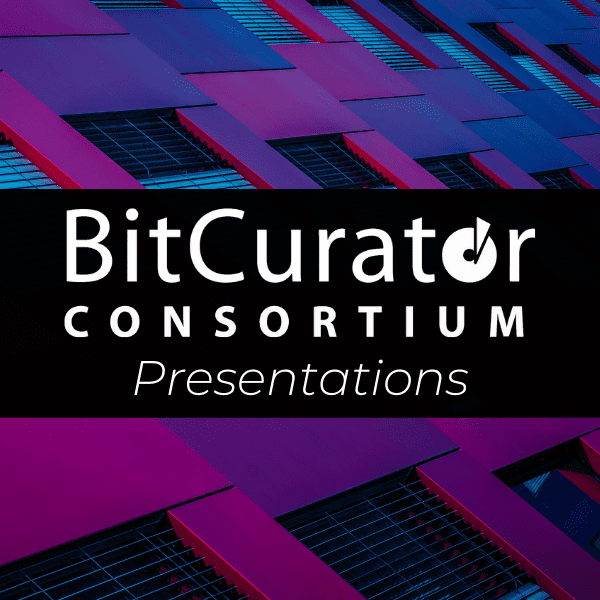Session 8 – Work Work Work Workflows
Brian Dietz, Julia Kim, Jessica Venlet | BitCurator Consortium
Communities of Practice: Building a Foundation for Born-Digital Processing
When I arrived at UNC Wilson Special Collections Library in 2016, newly hired in a digital archivist role, I found that roles for born-digital processing work were complex and distributed. This led me to start thinking about communities of practice and consistency for workflows and collections that were often a bit beyond my control. In order to work towards clarity, as well as boost my colleagues’ confidence and skills with born-digital work assigned to them, I have and continue to try a variety of training and in-reach techniques. In this presentation, I will share some of these experiences including some successes, things that didn’t work so well, and new opportunities on the horizon.
- Jessica Venlet, University at North Carolina at Chapel Hill Libraries
BitCurator: Beyond Environment
The NCSU Libraries has recently revised its digital archiving ingest and workflows. Until recently, we processed born digital materials using a hybrid Windows/BitCurator virtual machine environment. We now perform most of our work at the command line on a Mac. To support these new workflows, we have also updated our processing “wizard,” DAEV (Digital Assets of Enduring Value), which guides processors through workflows, produces preservation metadata, and integrates with ArchivesSpace. While we have moved away from the BitCurator environment for ingesting and processing data, the leap would not have been possible without the jumpstart provided through our experience using BitCurator. We also will continue to look to BitCurator for access and discovery tools and, more importantly, as a central connection point in a federation of digital archival practices. In this talk, we will present on our new working environment, including the rationale for the move; introduce DAEV, including its past and future, and how its built-in documentation supports staff in processing archival packages; and discuss how this all relates to the BitCurator community.
- Brian Dietz, NCSU Libraries
Time to clean out our closet: challenges accessioning fugitive media
The American Folklife Center at the Library of Congress is one of the world’s largest ethnographic archives and, from its inception in 1972, has specialized in multiformat content. While for years, AFC’s born-digital accessions outnumber analog, in previous decades flash drives, optical, disks, and hard drives accompanying analog collections were not migrated and ingested. In fact, non-standard and uncontrolled vocabularies made it impossible to estimate the extent of the problem. Over approximately 7 months, AFC’s digital assets specialist led a pilot study addressing this issue, first pulling and identifying the “fugitive media” spread across its 4 disparate physical locations. During the course of the pilot, over 5TB from 8 prioritized optical and floppy disk collections were migrated and ingested into the digital repository. More importantly, AFC had a much better accounting of the remainder of its fugitive media backlog and the minimal baseline workflows, practices, and policies necessary to better address them. The digital assets specialist will share some of the outcomes and unexpected lessons learned from this process.
- Julia Kim, American Folklife Center, Library of Congress
Access the Periscope livestream here: https://www.pscp.tv/bitconsortium/1vOGwVaEPZvKB
Read More
Brian Dietz, Julia Kim, Jessica Venlet. (September 14, 2018). Session 8 – Work Work Work Workflows. BitCurator Consortium.